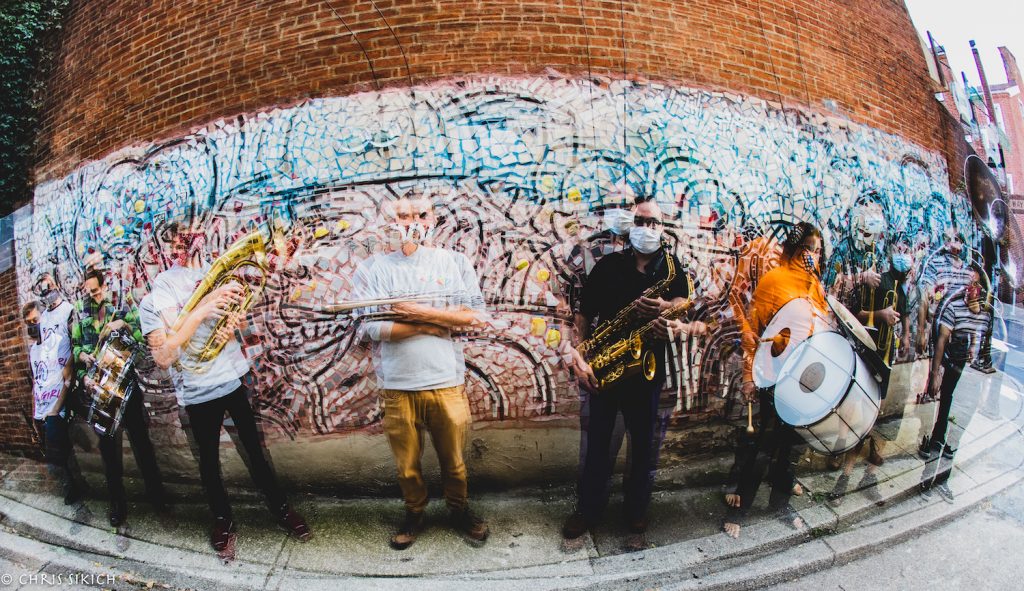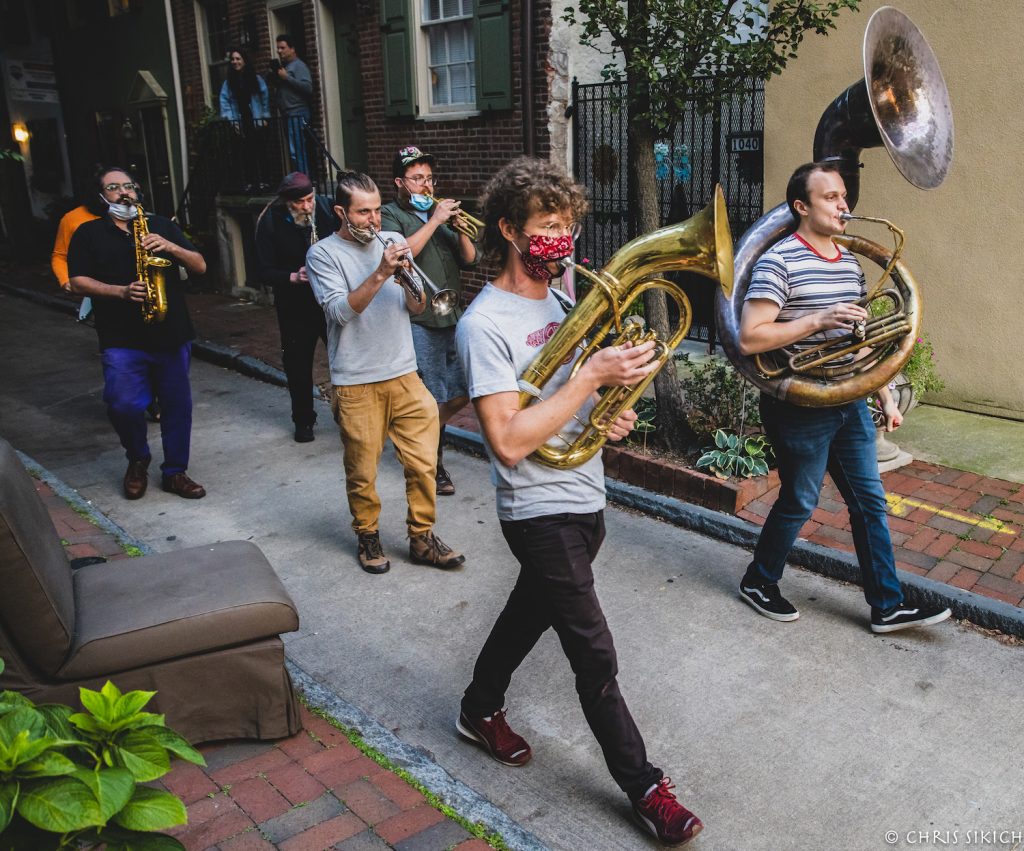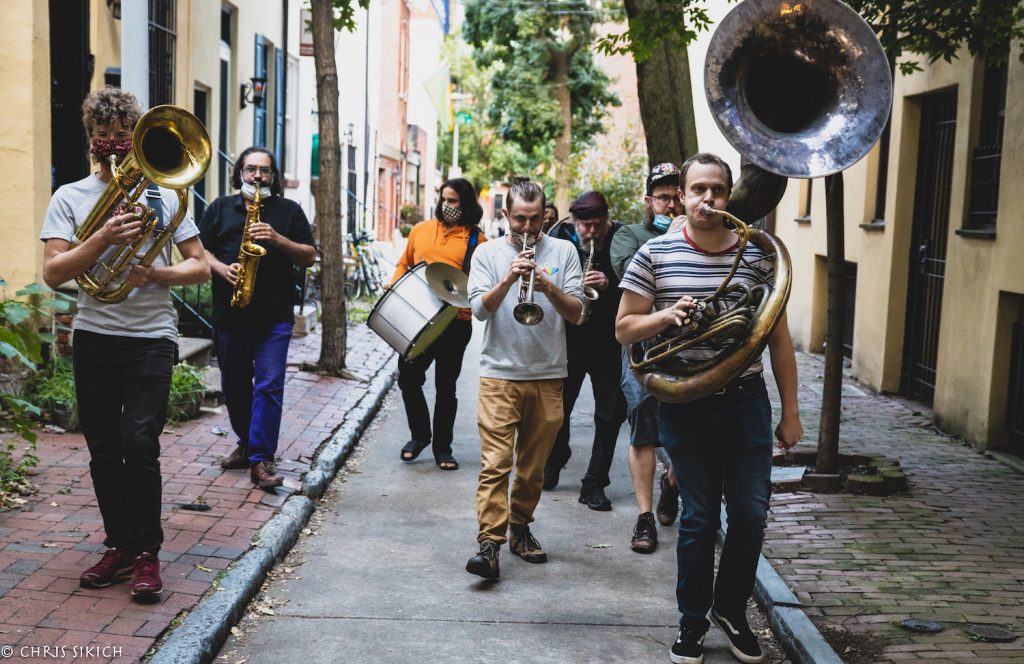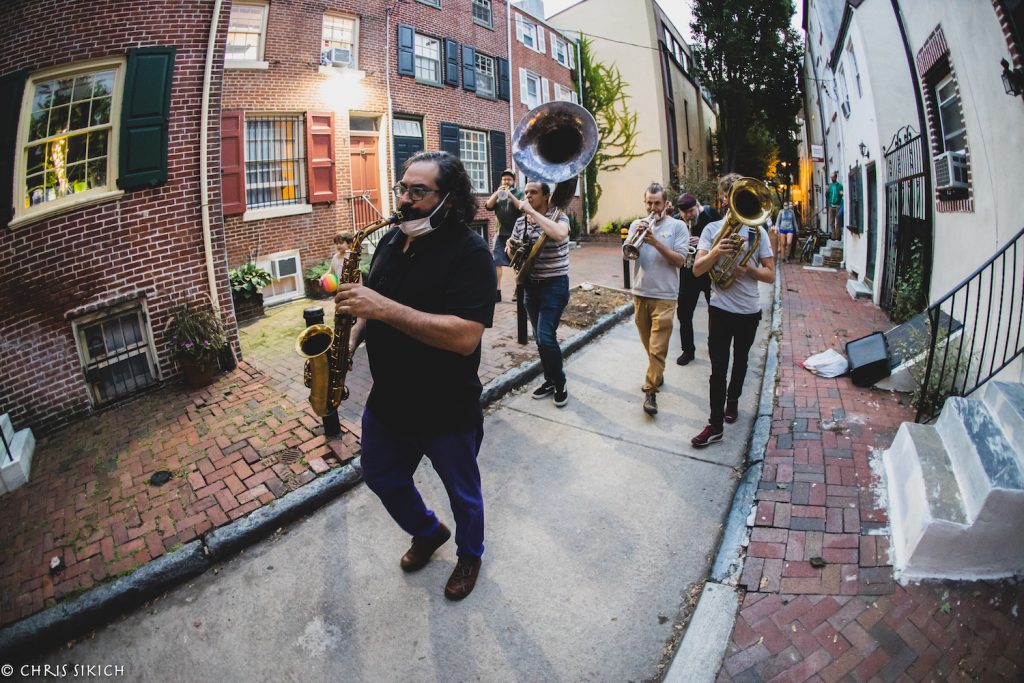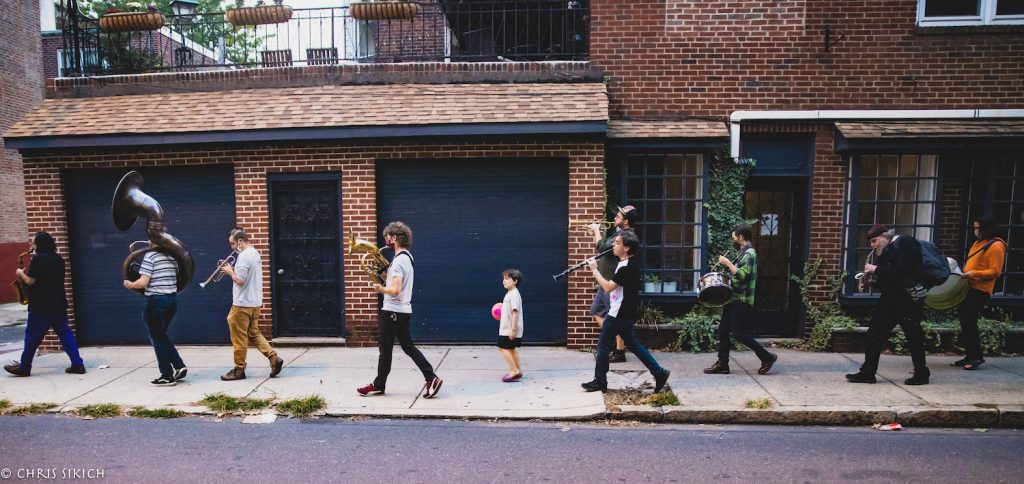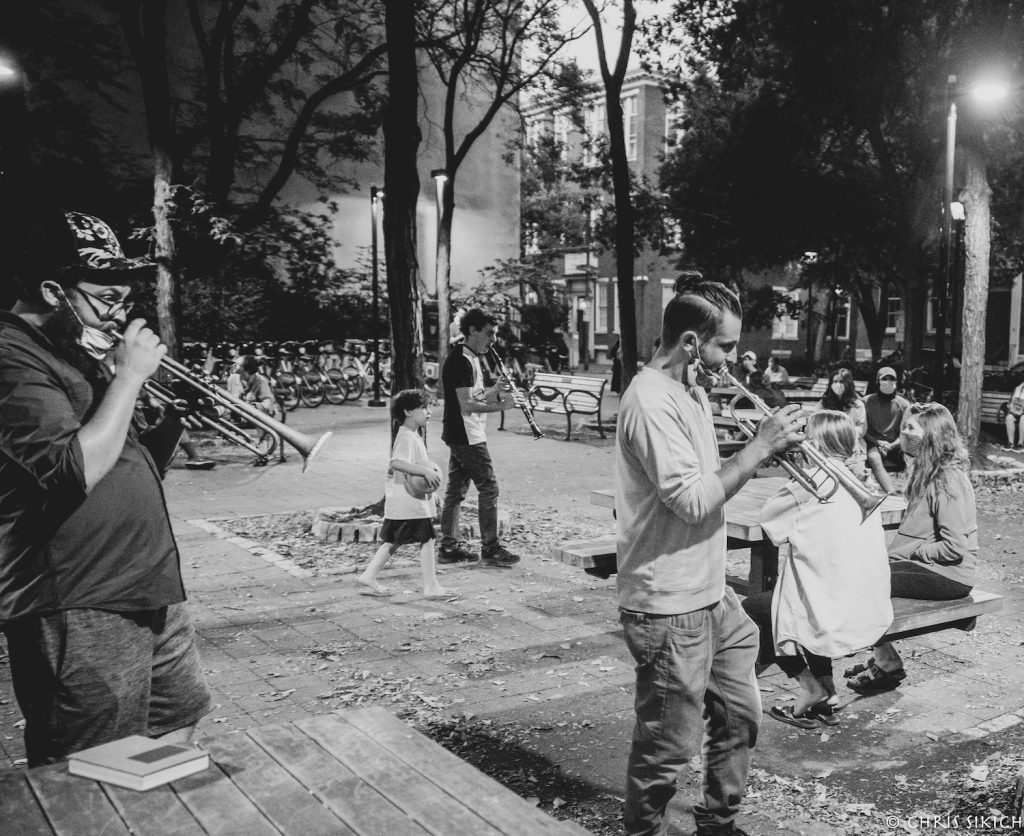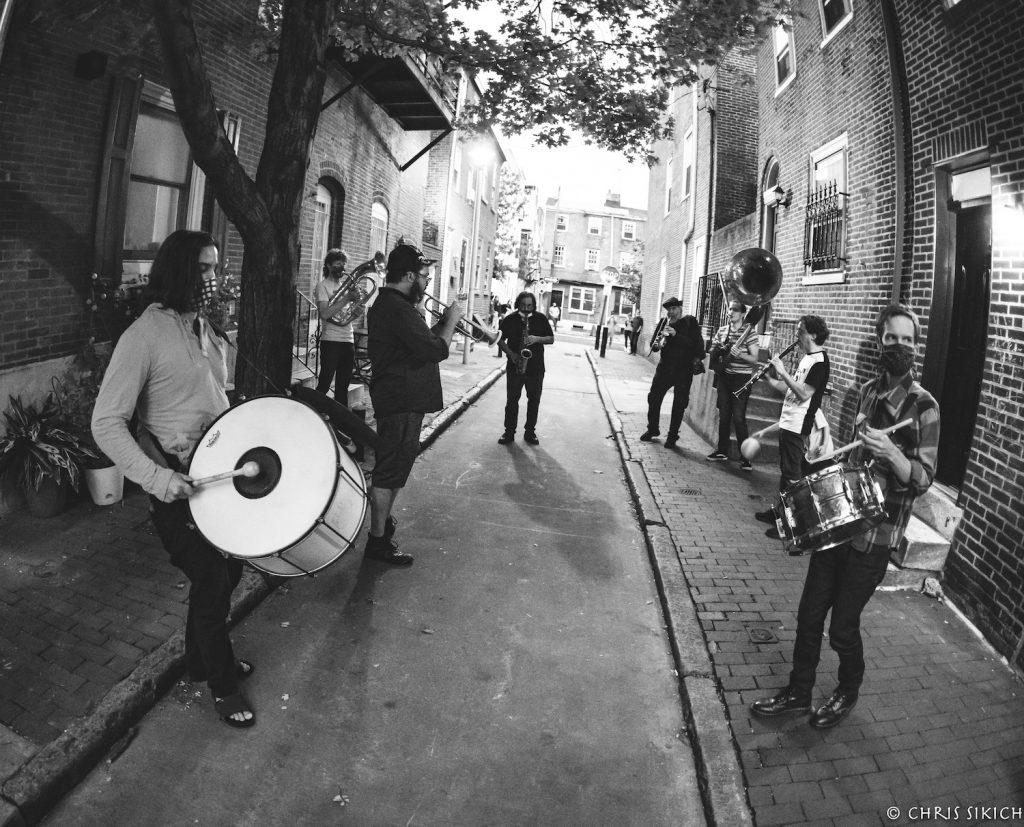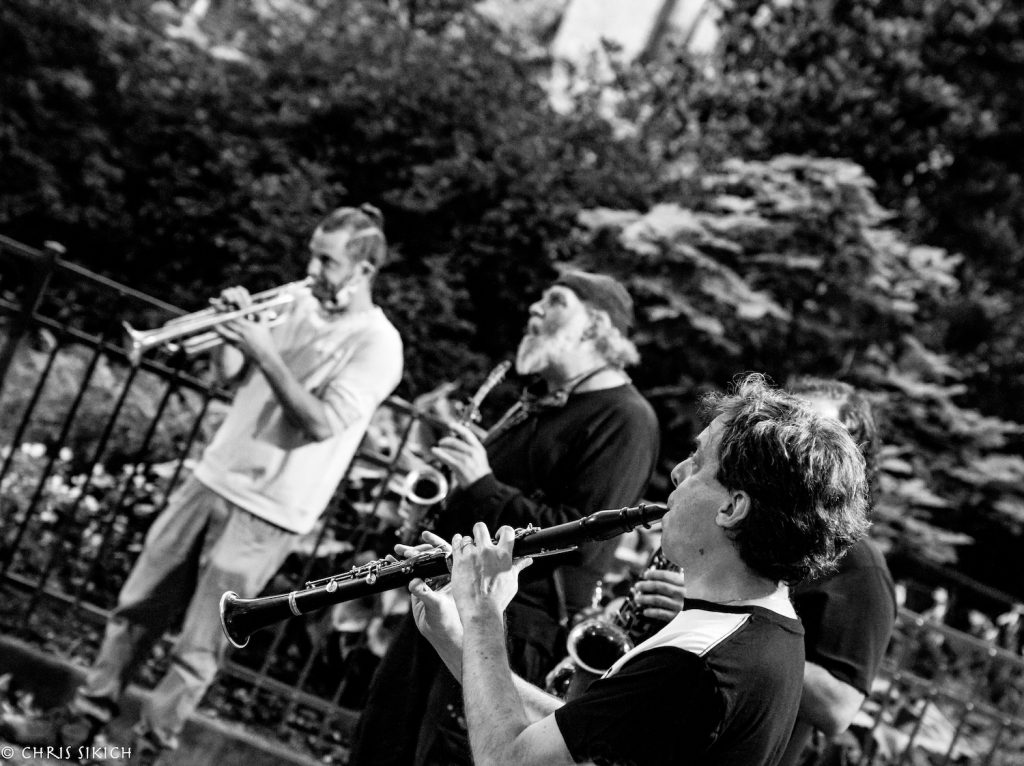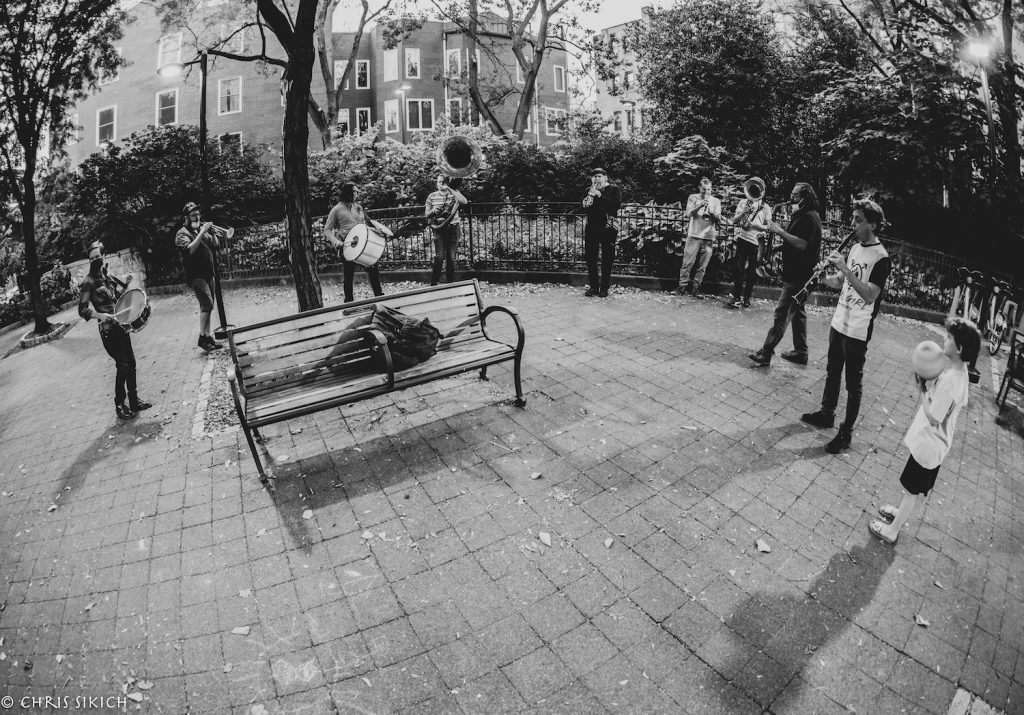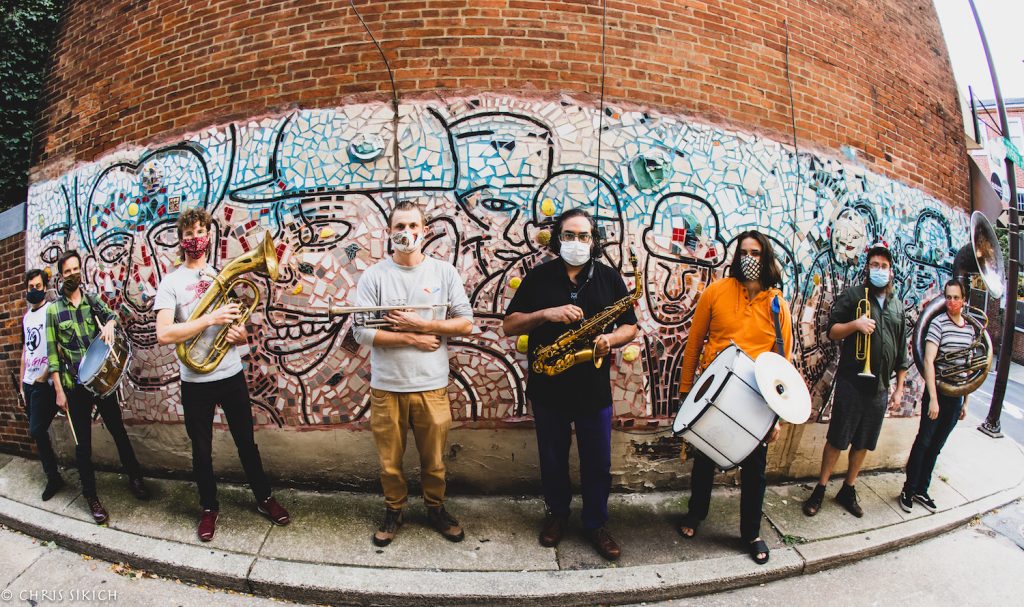
Like the majority of you, all of us in the Philadelphia area are staying at home, learning to adapt to our “new normal.” MAGNET is checking in with local musicians to see how and what they’re doing during this unprecedented time. Photos by Chris Sikich.
Gregg Mervine (drums, vocals): Like everyone else, all our gigs were canceled. I wanted to continue playing outside, but what if trumpets were virus cannons? We didn’t know, so we layed low. And then the protests exploded in the wake of George Floyd’s murder. I participated in the Clarion Call For Justice and needed to answer this call to action. But I also needed to figure out what that call was specifically asking of me.
By late June, WPO began rehearsing away in secluded areas. For me, however, playing our songs again in parks wasn’t spiritually lifting but the opposite: I left rehearsal feeling confused, lost. The notes we play are supposed to draw people together. Our art is situational. Personally, I need to be second-lining with dancing bodies or diving into a crowd with my drum, sharing sweat, getting knocked around and having all of those boundaries of self dissolve. Our music is liberating, ecstatic. I need it to be. Playing in a lonely corner of a park was like, well, what’s the point?
Frustrated, I siphoned my convictions and fears into a pair of songs: “Amerika The Grave” and “Ancestors.” We recorded “Amerika” remotely, which was a challenge, but we tapped into our years of playing together and it came out great. WPO never made a video before, but it felt right to do so. So we reached out to artist Keni Thomas, who crafted images and narratives, and I’m so excited to share it. “Amerika The Grave” came out yesterday, the Tuesday before the election, on Philly’s own Giving Groove label. Watch the video below.
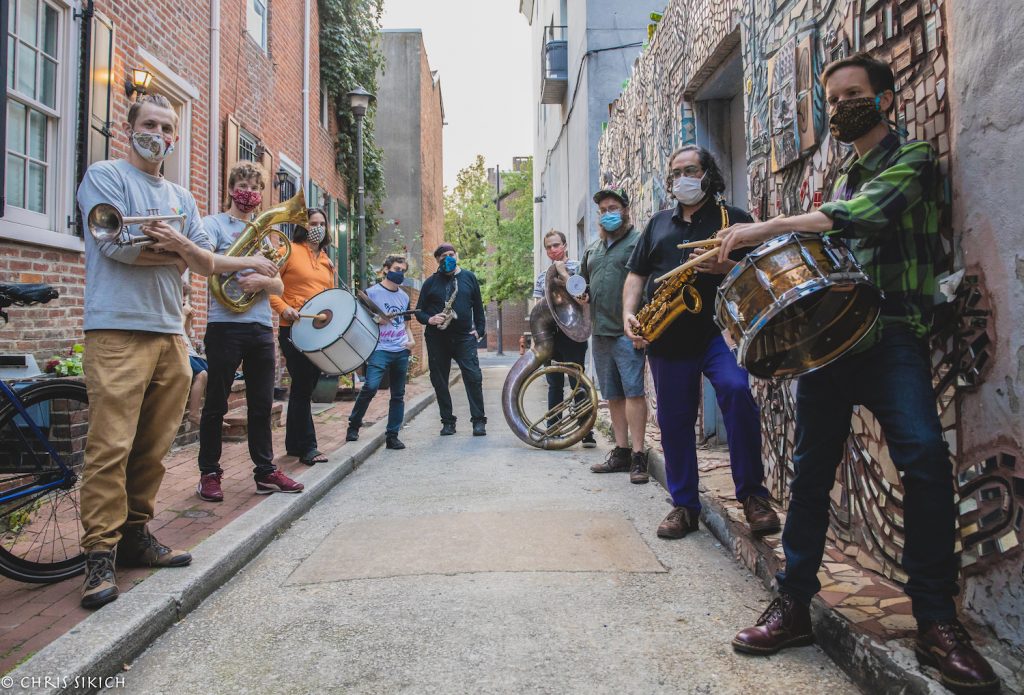
These songs take aim at that white, capitalist and repressive version of American history (as if America was ever “great”) and also at the colonialist/consumerist mentality that’s killing us and our planet. Despite scientific knowledge and global grassroots resistance, that vicious cycle is only accelerating. My son Miguel and his generation is fucked if we fail. So let’s not fail. A line from the song “Ancestors” says, “Will an answer fall like thunder from the mountaintop?/Fuck that, I dedicate this body to the future crop.” My pen fell when I wrote that line; just a silent knot in my stomach. What that call was asking had become clear.
The original WPO was united by activism, but activism became less a part of our identity over the years; playing this music on a high level became the focus. Not being able to play shows, parties and weddings has been a gift in a way—it reminded me of why I started this band in the first place, which was to create something uplifting and affirming for the local community. It’s about connecting to natural rhythms, disconnecting from devices, finding strength in each other and wielding the power we have. I don’t miss performing in front of live audiences. I miss live audiences performing with us.
Chad Brown (drums): Like most musicians, the loss of gigs and the social perks of music-making have affected me in stages, much like a grief cycle. Luckily, I have found solace in gardening and a potential new career path. I find that it makes much more day-to-day sense to wake up early to work in the sun growing and sharing food rather than waking up late, driving for two hours, playing for two, then driving home, all for the sake of entertainment over stiff drinks. There are costs involved with the brand of music-making involved in the private-party world—not to mention the waste involved with touring/festivals—and the COVID break has really put into perspective what is and is not important, with regards to music-making.
That said, I am currently in Serbia for music with Onebeat Balkans, a program that was postponed from March and is now being realized since Serbia is open. We’re finding the commonalities in the cultures of the U.S., Montenegro, Albania, Croatia, North Macedonia and Serbia through collaboration and development of original musical work and social activism. After the program is over, I will spend time in Vranje—southern Serbia, where much of the brass-band styles WPO is influenced by originate from—and study with musicians from the area.
Frank Rein (baritone horn, sousaphone): My music and my relationship with my music need to change in keeping with the transformation our world has undergone, but I’m not sure that I know how. For now, I’m continuing the aspects of my music work that I can. Via Zoom, I’m teaching a few private students who decided to continue when in-home lessons became unviable. I’m recording from my home for groups, including WPO, that are still pushing forward to make and release music. I enjoy both, and I’m thankful to have something to keep my attention on my instruments, but neither of these pursuits is filling my hours and interest in exactly the same way as my freelance career was before the pandemic. For that reason, I’m extremely thankful to have recently started living with my partner, Katie. I don’t want to imagine how this situation would have affected me a year ago.
The challenge of being a person and a citizen in the coming months and years will be greater than any musical task I could ever imagine. Wish me luck, and I wish good luck to you.
Dawn Webster (trumpet): After the last recession, during which I lost a lot of performing and teaching gigs, I decided to go back to school for something in the health professions. I eventually became an acupuncturist, although I think my heart is still in Balkan and Turkish music, as well as outdoors activities like thru-hiking. I have very mixed feelings on my role in the world right now. I’m grateful to be offering acupuncture in a safe, semi-private community setting—keeping people well and keeping things affordable. Patient numbers are down, but at least I have some work. However, I took a lot of student loans out for medical school, and they aren’t getting any cheaper. Would I be better to be an out-of-work—but debt-free—musician, with limited health risk to myself and those who surround me, but not doing much to help health directly? I’m truly unsure.
The break in music-making has allowed me to evaluate what I really want to be getting out of this thing that’s no longer winning my bread. I know a sense of being able to express myself and building supportive community are what I want to work toward and have been lacking in part. So I’ve reconnected with old colleagues and met up—virtually!—with new ones. I have contributed to some recording projects in Canada, Macedonia and Greece, and am fooling around with new-to-me instruments: kemençe, zurna. I’m trying to release my voice. In a time when input can be so overwhelming, I think the most important things are to feel good about just treading water, and to try when we can to go after the things stirring creative joy.
David Fishkin (saxophone): On Monday, March 9, WPO played at a surprise party for a dear friend. This turned out to be the last time we played together before everything shut down; by that weekend, a planned show at the University City Arts League had been canceled, and soon after that, everything on our calendar—concerts, festivals, collaborations, weddings, you name it—was wiped clean. Over the next few months, I endured the most barren period that I’d ever experienced in my musical life.
One mild afternoon in mid-May, while sitting on my roof, I heard a distant, heavy rumble; as it drew closer, I realized that it was unmistakably the sound of the Positive Movement drumline, and as they paraded down my block, I grabbed my horn and jammed with them from my rooftop. After they continued onward, I realized that it had been the first time in two months that I had played with musicians in person. However, during this bleak time, I was fortunate enough to draw inspiration and sustenance from my teaching. Every week, I looked forward to meeting virtually with my student ensemble from the Philadelphia Clef Club Of Jazz, my flute class from Tune Up Philly and my private students. Despite the limitations of the online format—i.e., not being able to play together in sync, etc.—it was so meaningful for me to be able to connect with my students, to see them grow and, occasionally, make the “mind-blown” expression through their computer screens.
In June, Philly trombonist Jeff Bradshaw organized the first Clarion Call For Justice. He sent out an open call for the brass community to convene on the steps of the Art Museum and to lift our voices against racial injustice. The emotions evoked in me that day were profound—when I watch video of the band playing “We Shall Overcome,” tears come to my eyes. It was a powerful statement, a joyful reunion for our Philly musical community, and for WPO, it became a galvanizing event, through which we realized that we could safely gather together outdoors.
The following day, we met to play at Clark Park, and since then, we’ve been meeting more or less on a weekly basis, sometimes to rehearse in seclusion, other times to play for people in public settings. Admittedly, playing music while physically distanced makes it much more difficult for us to connect with our audience. I miss the times when we could join the crowd on the dance floor and all feel that surging rhythm together, so that everyone in the room would become united as one giant band. I really miss that. But I’m truly grateful to have reconnected with my bandmates, who, over the past 10 years, have become like family to me.
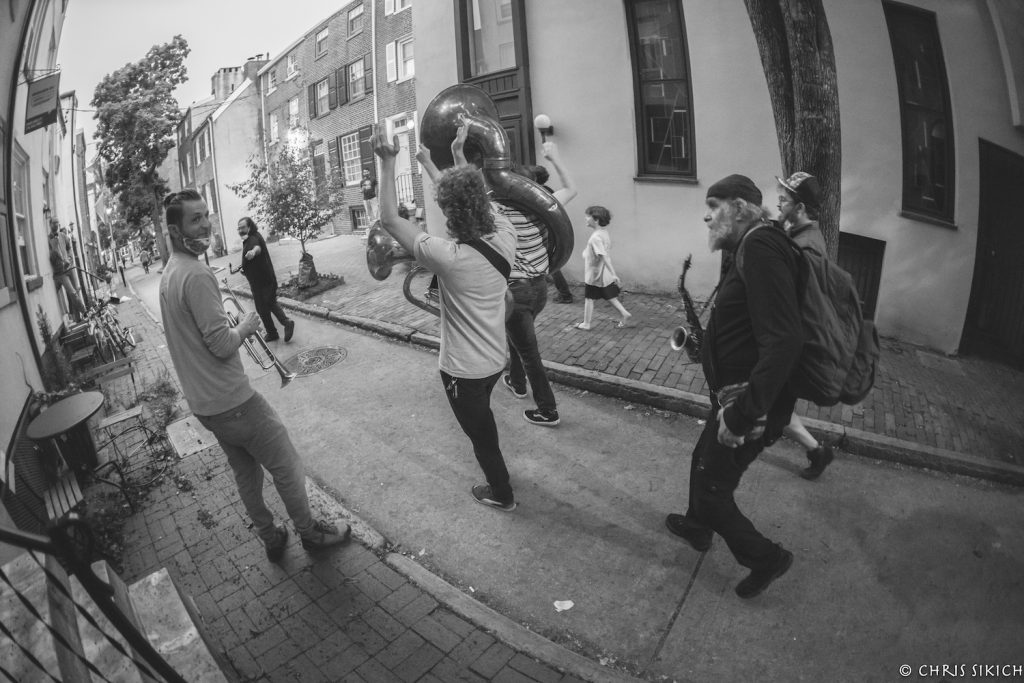
Eric Sherman (trumpet): Having creative projects to work on over the past 6 months has been crucial. It’s been a really good way to answer the “What am I going to do today?” question, especially when the days seem to meld together. Aside from that, cooking a lot and being outside have also been most necessary.
Elliott Levin (saxophone):
The Stead Of The Nation (8/1/20)
…But now, the basements are air-conditioned,
nocturnal emissioned… and filtered from the Hi-Vi-Fi-
rus-delity freq…uency… We still fest
Underground, hone word and tone poem, stone… Def
best foot feted forward… to survive, if
not thrive…. The Pan-Chrom-Ton-demic, systemic
Multi-Ethno-Kulti cleansing panic attack and
tacet tact…. to see which way the
wind blows whether manner of
fake fact…or- real fiction, will preside in
prediction of un-mailed vote registration
predilection to assuage the affliction, of
Science! Political or Mega-Meta-Physical…
A typical predicament, a pickle piper petered
in assent of change…. the blessed lessered
of few evils, alive and in the mattered, living
color-i-zation, of white and blues… read
in the tragi-comic book… bred…
graphically novel situation…
stead… of the Nation.
